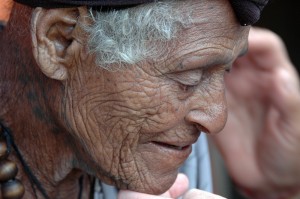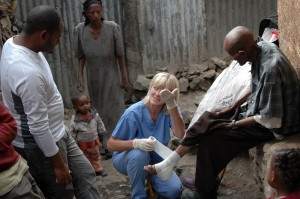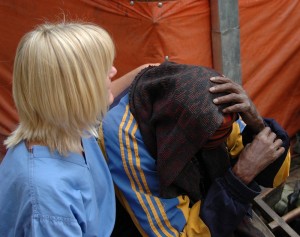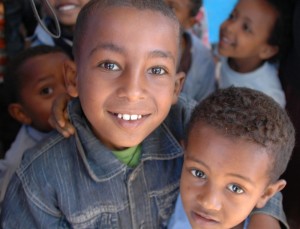The Incomperable Lady Di
Diane hails from Whales, is a semi-retired trauma care nurse and was, as are so many seekers, moved by something unknown to pack up a suitcase full of medical supplies and fly it, along with herself to Ethiopia. She wanted to volunteer somewhere in Africa and the reports about the relative safety of this country located at the crest of the horn put her on course for Addis Ababa. She landed in the guest house of Strong Hearts Ethiopia. She arrived having no predefined plan of any kind; this is the norm with African volunteer organizations, so she had no choice but to take matters into her own hands and created a program for herself and the people she had come to serve. Di struggled initially with the food and jet lag and as a result was quite ill but as soon as she was strong enough she grabbed her hand made medical kit; a suitcase on wheels stuffed with items of her trade and headed into the streets to see what aid she could provide the people of Kore. Kore is a community of lepers, the old and in-firmed, HIV victims and the marginalized desperately poor. There is a dump on the outskirts of town where women and children pick through the refuse day and night to find whatever they can to eat or sell for a few birr, the Ethiopian currency. Kore is indicative of the plight of the poor in Africa and in spite of the health problems that plague this village, and the glut of aid agencies that surround it, there are only a few doctors here and the medicine they dole out can range from the miserable to the very bad depending on the day and the doctor. Most residents don’t go to the clinics because they lack the finances to acquire the treatments, they have no way of getting there and because they just don’t have the strength to make the journey through the litter strewn streets. For Di this was a lot to take in.

She hailed from a successful background and was quite well off. Her village in whales was home to the likes of Sir Tom Jones and her husband Colin and she made a good living together. She had never seen anything like this before and couldn’t imagine people could exist like this. When she arrived at the dump for the first time she met Joshua, a 28 year old local to Kore who was doing his best to help his neighbors. For a young Ethiopian he had it pretty good living in a house with a solid roof and enough food on his table but he wasn’t content living a better life for himself when there was so much pain and ruin on the earthen streets around him. When they met, Joshua and Di saw a common heart and they became the caped crusaders of Kore, administering whatever care they could to anyone who walked up and asked for help. Joshua’s heart was wrapped around this community ever since he was a kid and he knew just about everyone. Armed with the trust of familiarity he and Lady Di were able to set up day clinics in the street or at someone’s house and they soon would have a cue of people wanting to see the white lady from England. Di was approached by men, women, and children with just about every kind of problem you might imagine including eye infections, physical trauma, liver disease, leprosy, skin infections, arthritis, tooth decay, sepsis, you name it. What made it even worse was the slew of misdiagnosed patients that came to her wondering why the medicine they were taking wasn’t helping and she often had to set them on a new treatment path far removed from the original suggested cure.
What struck me the most about Lady Di, as I followed her journey of compassion, was the motivation that moved her. Unlike many of the people I met traveling around the world doing volunteer work Diane didn’t feel she was called by some higher spiritual muse or ideal, she was much too practical for that. Instead she just had a yearlong lingering desire to get away from her perfect little British village and “do” something for someone else. She and her husband Colin, a successful lawyer in his own right, had a pretty good life. They were well traveled and had seen a lot of the world, they had raised three great kids and seen them all through good Universities and now watched as they became success stories themselves; and they were happily married after thirty years. Now that the nest was empty she had something pricking at her heart; something telling her to use her skills in a place where getting access to them was nearly impossible. She didn’t ignore that message like some of us might and instead headed to Africa alone to offer her gift of healing to anyone who asked. When I met her she had already been working in the community for over a week and staying in the guesthouse where the male dominated African social experience was a bit much for this woman of independence. Getinet; the leader of the Strong Hearts organization hosting our stay was a very caring but strong willed individual whose treatment of women could be construed as condescending by western standards and his stated objective that when it came to the alleviation of poverty “people must be changed from the inside out first” sometimes slowed the delivery and pace of material aid because he wanted the community and the individual to accept as much responsibility as they could before “Ferengi (foreign) relief” was administered. Getinet’s conviction on this important perspective, that is echoed accurately in books like When Healing Hurts was challenging for Di who came to heal the body not necessarily the soul and it appeared to her that his real issue was one of male arrogance and a lack of empathy for the very community he served. Because of that, in her mind he was a roadblock in the way of her mission. Over time as they got to know each other better I watched as both softened to the others perspective on the delivering of aid. I could see the transformation happening and observed the two of them begin to work as a team. Di eventually came to understand his perspective of personal responsibility and Christian ethic and Getinet showed his appreciation for her talents and the magic she was performing in Kore without judging her agnostic perspective to human relationship.
In the midst of all this Di, my friend Julie and I became very good friends. It was Diane who probed us at length about Orchids goals, why we were considering our hosts as potential partners and she challenged us to measure the motives of not only the team in Ethiopia but any other teams we might one day encounter. Her discriminating eye was a welcome education for me. I know my rose colored glasses are sometimes cemented to my head and her pragmatic approach to philanthropy was refreshing and educational. She reminded me that each step I take must be a measured one and that my tendency to see only the best in people can veil my impression if I’m not careful. I would tell her every day about how incredible she was because I see every effort carried on selfless shoulders as sacred and every outcome a blessing and all the care givers I ever come in contact with as amazing. For me Lady Di was in that beautiful company of men and women around the world but her view on the matter was “it’s just all in a day’s work”. When I think back on her my memory of Diane is one of a beautiful woman emboldened with a razor wit forever dressed in blue scrubs. I see her dragging around her old suitcase turned medical bag of mercy while she administered to her flock. Di would never use the word flock as she would likely find that term to parochial but whether or not she knew it she was in fact the people of Kore’s shepherd and for the three weeks she was in their midst she was their salvation. This woman of inner and outer beauty never stopped providing the aid she brought with her and because she often didn’t have the medicines necessary to treat the disease the only cure she could administer was her outstretched hand and heart. Even on the rare occasion she would take a day to recharge her batteries in the sun by the pool at The Addis Ababa Hilton she was chasing down the manager asking for donations of food left over from the previous night’s scraps of the wealthy.
Lady Di reminds me that the motivation to service comes in cloaks of different colors but when we each decide to put one on, no matter what the reason, we all wear a blanket of love and sharing that’s big enough to cover everyone we meet.





